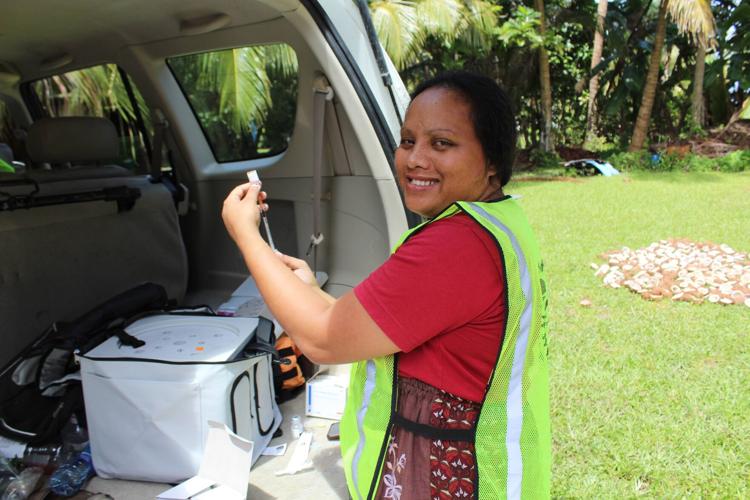Since it began allowing people into the country in mid-2020, the Marshall Islands has maintained one of the world’s strictest Covid-prevention entry systems.
As a result, this western Pacific nation remains one of the few countries in the world that is still Covid-free, even as many of its Pacific neighbors have seen their first Covid spread in the past several weeks.
Now, the head of the government’s National Disaster Committee is hopeful the government will adopt a reduced quarantine policy for people coming to the Marshall Islands starting next month.
Chief Secretary Kino Kabua, the NDC chairperson, said that in line with United Airlines being unable to continue a “travel bubble” for repatriation groups means the longer quarantine of seven-to-14-days “does make any sense” to continue. She also said the significant decline in Hawaii Covid cases is a positive sign for looking to reduce the quarantine period from seven to three days.
Currently, the Marshall Islands requires seven days of managed quarantine with multiple Covid tests in Hawaii for people who are fully vaccinated, and 14 days’ quarantine for those who are not. On arrival in Marshall Islands, they must quarantine for another 14 days.
The Ministry of Health and Human Services has recommended maintaining the status quo for the time being. The government’s Cabinet, however, has approved in principle the plan to move to a three-day quarantine period in Hawaii.
“United Airlines is not able to continue our safe travels bubble so we are getting feedback from folks who have returned to Marshall Islands, including a few government heads of agencies who just returned from personal and duty travel, that it does not make any sense to do seven days’ quarantine in a hotel and come to the airport to mix and mingle with everyone flying out,” said Kabua. “Folks outside the Marshall Islands have adapted to living with Covid-19 and that is something the Marshall Islands needs to accept. We need to accept, adapt and act.”
She said the U.S Centres for Disease Control “does not recommend pre-quarantine before travel and it makes sense now for us because United Airlines cannot continue our travel bubble.”
The Chief Secretary said it is essential to maintain the “quarantine on arrival in the Marshall Islands as it serves a purpose — to catch any cases while in strict quarantine and have them remain in quarantine until they are clear and no longer contagious before release into the community. It is all about controlled entry upon arrival and into the quarantine centre until the quarantine phase is over and tests are negative.”
The Marshall Islands has now shifted from its earlier repatriation program to what it calls the Safe Travels Programme.
“Safe Travels Programme started in January 2022,” said the Chief Secretary. “March is when Marshall Islands citizens will need to pay for their quarantine costs in Honolulu and for the final phase in Marshall Islands.” Kabua is anticipating 60-80 people in the March Safe Travels groups.
“I expect a reduction in numbers because of the quarantine fees that a traveler will need to cover himself or herself,” she said. The reduction to three days in Honolulu will also reduce the financial burden for citizens traveling.
For the repatriation programme that started in October 2020, the Marshall Islands government “spent US$2.5m and counting from budget support from our partners,” said Kabua. “This budget support has been exhausted.”
As part of an effort to ramp up the Covid vaccination rate in the country, the Ministry of Health and Human Services launched a house-to-house vaccine campaign — the same as it did 14 months ago when the Moderna vaccine first became available.
In the first two days of the campaign last week, 1,392 shots were administered, more than half of which — 748 — were booster shots.
Over the past several months, as Covid booster shots became available, the uptake of the boosters has been modest. Although there was a spike in people getting the third booster shot in January after news of three positive Covid border cases at Kwajalein and the spread of Covid in Kiribati, Palau and elsewhere, the numbers dropped off by the end of January. In the two weeks from January 26 to February 9, only 140 people came into the hospitals on Majuro and Ebeye to get the boosters.
The first two days delivered nearly 10 times the number of shots administered in the previous two weeks.
“This is without question the best way to defend both you and your family against Covid-19,” said Health Secretary Jack Niedenthal in a statement. (Vaccination) “is the way we defeat this virus. We know from other countries close by to us that those who have been vaccinated and boostered do not get nearly as sick as those who have not. Most if not all of the hospitalisations and serious cases and even deaths are suffered by those who have not been vaccinated.”
Niedenthal pointed out that people in the Marshall Islands are “vulnerable to this virus because we have extremely high numbers of people with diabetes and other health issues that causes Covid to be even worse.
SOURCE: MARIANAS VARIETY/PACNEWS













